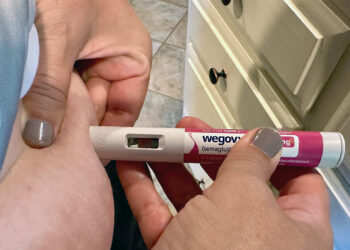A new ultrasound-based treatment that destroys liver cancer tumours without surgery or radiation will be offered to NHS patients this summer in a European first.
The therapy, called histotripsy, is a non-invasive and non-thermal technique that uses focused sound waves to break down cancerous tissue. It causes minimal damage to surrounding organs and may be delivered in a single 30-minute session.
It is being hailed as a breakthrough by clinicians, patients, and academics.
Bubble Cloud Destroys Tumours Without Heat or Blades
Histotripsy works by generating high-amplitude, short ultrasound pulses via a platform known as the Edison System. These pulses create a “bubble cloud” from gases naturally present in targeted tissue. These bubbles form and collapse in microseconds, generating mechanical forces strong enough to destroy and liquefy targeted tumour tissue at cellular and sub-cellular levels.
The remnants are absorbed by the body within one to two months, leaving minimal scarring.
Treatment can be used both for primary liver cancer and metastatic disease in the liver. The treating physician can monitor the bubble cloud continuously and observe the treatment effect in real time.
Animal research also suggests that the treatment may stimulate an immune response and induce abscopal effects – shrinkage of untreated tumours elsewhere in the body.
NHS Access Through Fast-Track Innovation Scheme
The technology was developed by ultrasound researchers at the University of Michigan and commercialised by US-based company HistoSonics.
Health and Social Care Secretary Wes Streeting approved early access to the treatment under an unmet clinical need authorisation.
A joint announcement on 10 June from the Department of Health and Social Care and the Medicines and Healthcare products Regulatory Agency confirmed its authorisation for controlled early access use through the Innovative Devices Access Pathway (IDAP).
The government described the move as part of its “blitz on red tape” to support innovation in the NHS.
First Patients to Be Treated in Cambridge
The first patients will receive histotripsy at Addenbrooke’s Hospital in Cambridge this summer. The treatment is expected to reduce complications, shorten recovery time, and free up beds and surgical capacity. It will be available for both NHS and private patients.
The technology was procured and installed using a donation from the Li Ka Shing Foundation, which has a longstanding history of funding projects at the University of Cambridge.
Roland Sinker, chief executive of Cambridge University Hospitals, described histotripsy as “an exciting new technology that will make a huge difference to patients”.
Liver Cancer Survival Remains Low
According to Cancer Research UK, liver cancer is the 17th most common cancer in the UK. On average, over 6500 cases are diagnosed annually, and more than 5800 people die from the disease each year.
Current treatment modes include surgery, chemotherapy, thermal ablation, targeted drugs, and radiotherapy.
Fiona Carey, co-chair of the Cambridge Cancer Research Hospital patient advisory group, who has advanced kidney cancer, said the announcement was “seriously good news.” She added, “for patients for whom ordinary surgery is no longer an option, this could make all the difference.”
Histotripsy is also being explored as a potential treatment for other hard-to-reach cancers, including kidney and pancreatic tumours.
Dr Sheena Meredith is an established medical writer, editor, and consultant in healthcare communications, with extensive experience writing for medical professionals and the general public. She is qualified in medicine and in law and medical ethics.
Source link : https://www.medscape.com/viewarticle/ultrasound-liver-cancer-therapy-set-nhs-launch-2025a1000fz8?src=rss
Author :
Publish date : 2025-06-16 07:53:00
Copyright for syndicated content belongs to the linked Source.














